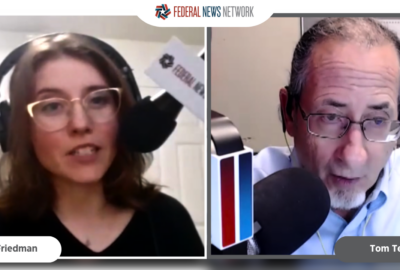This agency is looking for people who have beat the substance abuse cycle
The Substance Abuse and Mental Health Services Administration (SAMHSA) is looking for people who have experienced and overcome substance abuse.
A unit of the Health and Human Services Department has launched a call for an unusual type of leader. The Substance Abuse and Mental Health Services Administration (SAMHSA) is looking for people who have experienced and overcome substance abuse in themselves or family members. It’s called the SAMHSA Trailblazers in Advancing Recovery (STAR) Awards program. The Director of SAMHSA’s Office of Recovery, Paolo del Vecchio, shared details with the Federal Drive with Tom Temin.
Interview transcript:
Tom Temin
What are you exactly looking for here? And who are these STARS types of people that you’re looking for?Paolo del Vecchio
Well, we are looking for individuals who’ve been champions of recovery, those who have experienced these conditions themselves. And we know Tom, of course, that mental health and addictions are very common conditions; up to one in five of us experience these conditions, myself included. I’ve been a federal employee for over 29 years. But I’m also an individual who identifies as having lived experience of both mental health and addictions. And we know recovery is possible. We know that the importance of overcoming the stigma, the prejudice and discrimination that still exists with these conditions is really important for us to focus on. Particularly these days, where mental health and addictions are very problematic, where we see over 100,000 Americans die by overdose last year, where suicide is the second leading cause of death among young people. But the reality is that we do recover, we’re able to overcome these conditions and live full lives in our communities.Tom Temin
And so you’re looking for people in the private sector, for example, that have assumed leadership positions and advocated, such as yourself, only on the outside.Paolo del Vecchio
That’s our primary focus is looking for those champions at the state and local levels who’ve made a difference.Tom Temin
State and local government, or could it be someone who was, say, a business leader somewhere?Paolo del Vecchio
It could be any, both public and private?Tom Temin
All right, and what’s your outreach methodologies for people to be able to be aware of this program?Paolo del Vecchio
Yeah, we’re using a variety of ways to disseminate information. We have a nomination form that’s live right now. So if folks go to our website, samhsa.gov, they can find out information about this. Certainly, social media, and efforts like your own program, are key ways of getting the word out.Tom Temin
I imagine there are support groups and 12 point programs and state and local programs that also address this issue. So might that be a good place to reach out through?Paolo del Vecchio
Absolutely, 12 Step support groups, family organizations, recovery community organizations across the nation.Tom Temin
And by the way, you mentioned the 100,000 people that died of overdoses in the last year. A lot of this fentanyl is coming in. And this is a big new emerging problem. Have you found that that has the danger of crowding out some of the chronic issues like alcohol, and substances we’re long familiar with?Paolo del Vecchio
Yes, certainly. Fentanyl is a major concern. And that’s a leading factor in terms of why we’re seeing continued large numbers of people dying due to overdose. But we can’t forget alcohol. I mean, you are right, we look at the data. In fact, when it comes to alcohol misuse in this nation, it’s an often overlooked condition and in terms of its contributions to people dying early, early mortality, in fact, overshadows opioid overdoses, sadly.Tom Temin
And by the way, do people like have an a priori sensitivity to substances? And that can lead to abuse? Or can abuse lead to the mental condition that continues it? Or maybe is it a little bit of all of the above?Paolo del Vecchio
I think it’s a little bit all of the above, Tom. It’s a chicken and egg kind of question. We know that mental health and addictions often go together. Again, my own story is just one example of that. But that is often the case.Tom Temin
And congratulations on 29 years of service. That’s an accomplishment all by itself. We’re speaking with Paolo del Vecchio, Director of the Office of Recovery at the Substance Abuse and Mental Health Services Administration, part of HHS. And what will happen to those that are identified as as these STAR recipients? Do they get a trophy or a speaking tour? What happens?Paolo del Vecchio
Yes, we’re hosting a gala event in Washington at HHS headquarters at the Humphrey Building on the afternoon of September 24. That event also will be webcast so folks can tune in and see that.Tom Temin
And what are the deadlines for nominations?Paolo del Vecchio
Deadlines for nominations are open now until July the 18th.Tom Temin
All right, so people pretty much should get on it pretty soon then. I just wanted to delve into that issue of recovery a little bit more, because as you exemplify, recovery is possible. But yet, in the same sense, someone is always vulnerable. And you hear about ‘once an alcoholic, you’re always an alcoholic.’ But that doesn’t mean you’re having alcohol; is that the case across the board with substance abuse?Paolo del Vecchio
It is the case; again, data that we’ve collected at SAMHSA, across the nation, is that again, a vast majority of individuals are able to overcome these conditions. In fact, our data shows that fully 70% of people who have had these conditions, identify as being in recovery today. And yeah, we have a saying in recovery that one day at a time, and that there’s always concerns about people having recurrence of symptoms, and going back and using and that is the nature of these are chronic health conditions similar to diabetes, in that it’s important for people to continue to take care of themselves on a daily basis.Tom Temin
Yeah, I guess it’s harder than can be perhaps externally observed to kick a habit. And you mentioned diabetes, people trying to reduce sugar. Sugar is like a really powerful substance, in that sense. I think the same receptors in the brain work for fentanyl, as well as for sugar.Paolo del Vecchio
It can be really tough, and it takes courage to start and continue your journey of recovery. From my own self, I do a variety of things. So like, I exercise every morning, I watch what I eat, I make sure I have a good social network of people. I do things like play the guitar, and garden. I mean, all these kinds of things helped me with my wellness. And that’s what people find really helpful as well as ongoing treatment. So I continue to receive therapy myself today.Tom Temin
Sure. And with respect to the STAR Awards, I believe it’s also eligible to family members. And that’s an important part of this, it may be that the person who has the abuse challenge can be helped by family members, because sometimes they suffer along with the person.Paolo del Vecchio
Absolutely. I mean, family is so critical to our recovery. And, again, in my own journey, family has been essential. So yeah, we’re recognizing families, we’re recognizing young people in particular here, those that have focused on equity. We’re seeing also the growth of a peer support workforce across the country. People like myself, who are giving back and working in mental health and addictions, we’re recognizing them, recognizing advocates, recognizing providers who are providing the essential care to help our recovery as well.Tom Temin
And from what you say, it sounds as if hiding it is not a good strategy, but really being out in the open with it. And that way people can help.Paolo del Vecchio
That’s very true Tom. Too often, these are conditions, because of the stigma, that are not out in the light. And what research in fact has shown is that when people like myself, when we disclose the condition, that they see us as people beyond the labels that are put on us, not as addict, as alcoholic, as someone with a mental health problem, but as your neighbor, as your coworker in the federal government.Tom Temin
July 18 is the deadline to nominate someone. Paolo del Vecchio is Director of the Office of Recovery at the Substance Abuse and Mental Health Services Administration.
Copyright © 2025 Federal News Network. All rights reserved. This website is not intended for users located within the European Economic Area.
Tom Temin is host of the Federal Drive and has been providing insight on federal technology and management issues for more than 30 years.
Follow @tteminWFED






